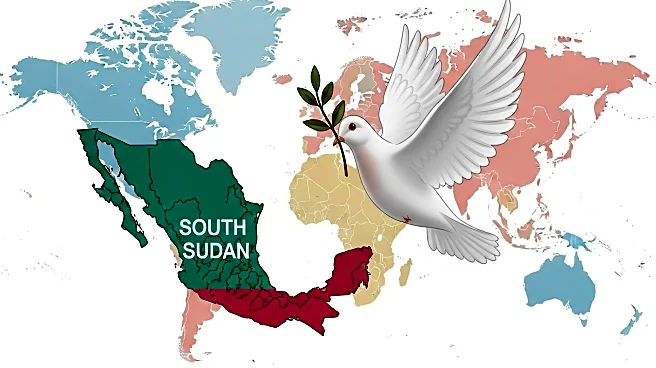What's Happening?
South Sudan has repatriated Jesus Munoz Gutierrez, a Mexican national who was deported from the United States to South Sudan. Munoz's return to Mexico was confirmed by Ambassador Apuk Ayuel Mayen, spokesperson for South Sudan’s Ministry of Foreign Affairs, during a press conference at Juba International Airport. Munoz expressed feeling 'kidnapped' by the US when he was sent to South Sudan, stating that he was supposed to be returned to Mexico after completing his time in the United States. Munoz was one of eight individuals deported from the US to East Africa in May, initially held in Djibouti before being sent to South Sudan following a Supreme Court ruling. The Trump administration has been coordinating deportations with several African countries, including Rwanda, Uganda, and Eswatini.
Why It's Important?
The deportation of Munoz and others to South Sudan highlights the controversial practice of sending migrants to third countries, which has faced criticism from rights groups and legal challenges. This practice raises concerns about the treatment and rights of deportees, especially when sent to countries with unstable conditions like South Sudan. The broader implications involve international relations and the legal responsibilities of countries involved in such deportations. The Trump administration's coordination with African nations for deportations could affect diplomatic ties and influence immigration policies globally.
What's Next?
South Sudan is working with the home governments of the remaining six deportees to facilitate their repatriation. The situation may prompt further legal scrutiny and diplomatic discussions regarding the deportation practices of the US. Countries involved in these agreements may face pressure from international rights organizations and their own citizens to reconsider their participation in such arrangements.
Beyond the Headlines
The ethical implications of deporting individuals to countries with known instability and violence are significant. This practice may lead to long-term shifts in international law regarding the rights of migrants and the responsibilities of deporting nations. The cultural and humanitarian dimensions of these deportations could influence future immigration policies and international cooperation on migrant issues.









